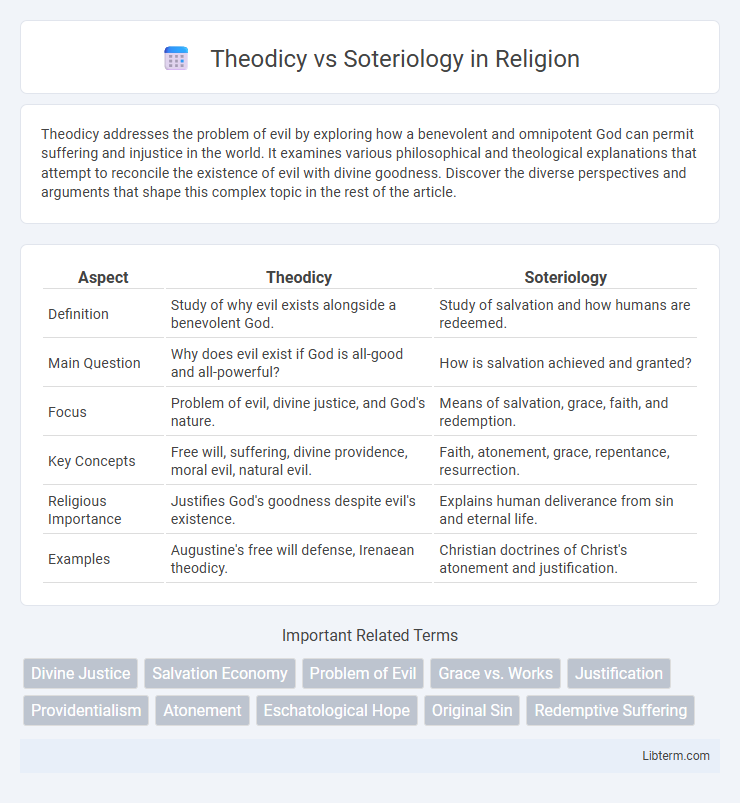Theodicy addresses the problem of evil by exploring how a benevolent and omnipotent God can permit suffering and injustice in the world. It examines various philosophical and theological explanations that attempt to reconcile the existence of evil with divine goodness. Discover the diverse perspectives and arguments that shape this complex topic in the rest of the article.
Table of Comparison
| Aspect | Theodicy | Soteriology |
|---|---|---|
| Definition | Study of why evil exists alongside a benevolent God. | Study of salvation and how humans are redeemed. |
| Main Question | Why does evil exist if God is all-good and all-powerful? | How is salvation achieved and granted? |
| Focus | Problem of evil, divine justice, and God's nature. | Means of salvation, grace, faith, and redemption. |
| Key Concepts | Free will, suffering, divine providence, moral evil, natural evil. | Faith, atonement, grace, repentance, resurrection. |
| Religious Importance | Justifies God's goodness despite evil's existence. | Explains human deliverance from sin and eternal life. |
| Examples | Augustine's free will defense, Irenaean theodicy. | Christian doctrines of Christ's atonement and justification. |
Defining Theodicy and Soteriology
Theodicy addresses the philosophical and theological problem of reconciling the existence of evil and suffering with an omnipotent, omnibenevolent God. Soteriology focuses on the study of salvation, exploring doctrines related to how humanity is redeemed from sin and granted eternal life through divine intervention. Both disciplines are central to Christian theology, with theodicy emphasizing the justification of God's goodness amid evil, and soteriology concentrating on the mechanisms and significance of salvation.
Historical Perspectives on Theodicy
Historical perspectives on theodicy trace back to ancient philosophical and religious traditions grappling with the problem of evil in the context of a benevolent deity. Early theodicies, such as those by Augustine and Aquinas, sought to reconcile divine justice with human suffering through concepts like original sin and free will. These foundational ideas influenced later theological debates, contrasting with soteriology, which concentrates on the doctrines of salvation and redemption rather than the justification of God's permissive allowance of evil.
The Evolution of Soteriological Thought
Soteriology has evolved from early theological interpretations emphasizing salvation through faith to more complex understandings involving grace, free will, and divine justice, contrasting with theodicy's focus on reconciling God's goodness with the existence of evil. Historical shifts in soteriological thought reflect changing responses to doctrinal challenges and cultural contexts, moving beyond simplistic atonement models toward integrative approaches involving communal and eschatological dimensions. This evolution highlights the dynamic interplay between human experience of salvation and theological explanations of suffering and justice within Christian traditions.
The Central Problem of Evil
Theodicy addresses the central problem of evil by seeking to reconcile the existence of suffering and moral evil with the notion of an omnipotent, benevolent God, often exploring justifications for why evil persists in a world governed by divine providence. Soteriology, in contrast, focuses on the study of salvation and how redemption through Jesus Christ offers solutions to human sin and suffering. Understanding the distinction between theodicy and soteriology is crucial for comprehending theological responses to evil and the role of divine grace in overcoming it.
Salvation Across Religious Traditions
Theodicy addresses the problem of evil and justifies God's allowance of suffering, while soteriology explores the doctrines of salvation and deliverance from sin or evil. Salvation concepts vary significantly across religious traditions, including Christianity's emphasis on grace through Jesus Christ, Islam's focus on submission to Allah and righteous deeds, and Hinduism's pursuit of moksha through karma and dharma. Understanding these doctrines highlights how different faiths reconcile human suffering with divine purpose and ultimate redemption.
Theodicy’s Influence on Belief Systems
Theodicy addresses the problem of evil by explaining how a benevolent, omnipotent God permits suffering, significantly shaping belief systems that grapple with faith amidst adversity. Its influence extends to moral frameworks, encouraging interpretations that reconcile divine justice with human experience, often impacting doctrines related to salvation and divine purpose. This theological inquiry informs soteriological views by providing context for the necessity and nature of salvation in a world perceived as flawed or fallen.
Soteriology and Divine Justice
Soteriology centers on the study of salvation and the means by which divine grace redeems humanity, emphasizing the role of Christ in reconciling sinners with God. Divine justice in soteriology reconciles God's righteous judgment with mercy by affirming that salvation is both a gift of grace and a response to sin's consequences. This theological framework highlights how salvation upholds divine justice through the atonement, ensuring moral order while offering redemption.
Key Philosophical Debates
Theodicy addresses the philosophical problem of evil and suffering in relation to an omnipotent and benevolent God, questioning how divine justice reconciles with worldly injustice. Soteriology centers on the study of salvation, exploring how redemption and human liberation are achieved through divine grace and human agency. Key debates contrast the justice and mercy of God in theodicy with the mechanisms and efficacy of salvation in soteriology, highlighting tensions between divine sovereignty and human responsibility.
Contemporary Issues in Theodicy and Soteriology
Contemporary issues in theodicy examine the problem of evil in light of global crises such as pandemics, climate change, and systemic injustice, challenging traditional divine justice narratives. Current soteriological debates address inclusive salvation, the role of interfaith dialogue, and the impact of social liberation movements on understanding redemption. These discussions integrate philosophical ethics, cultural contexts, and theological doctrines to reconcile human suffering with divine salvation effectively.
Integrating Theodicy and Soteriology in Modern Theology
Integrating theodicy and soteriology in modern theology involves addressing the problem of evil while emphasizing salvation's transformative power through Christ. Contemporary theologians explore how suffering and redemption coexist, proposing that divine justice and mercy are reconciled through the salvific work of Jesus. This integration fosters a holistic understanding that pain and redemption together reveal God's purpose in human history.
Theodicy Infographic

 libterm.com
libterm.com